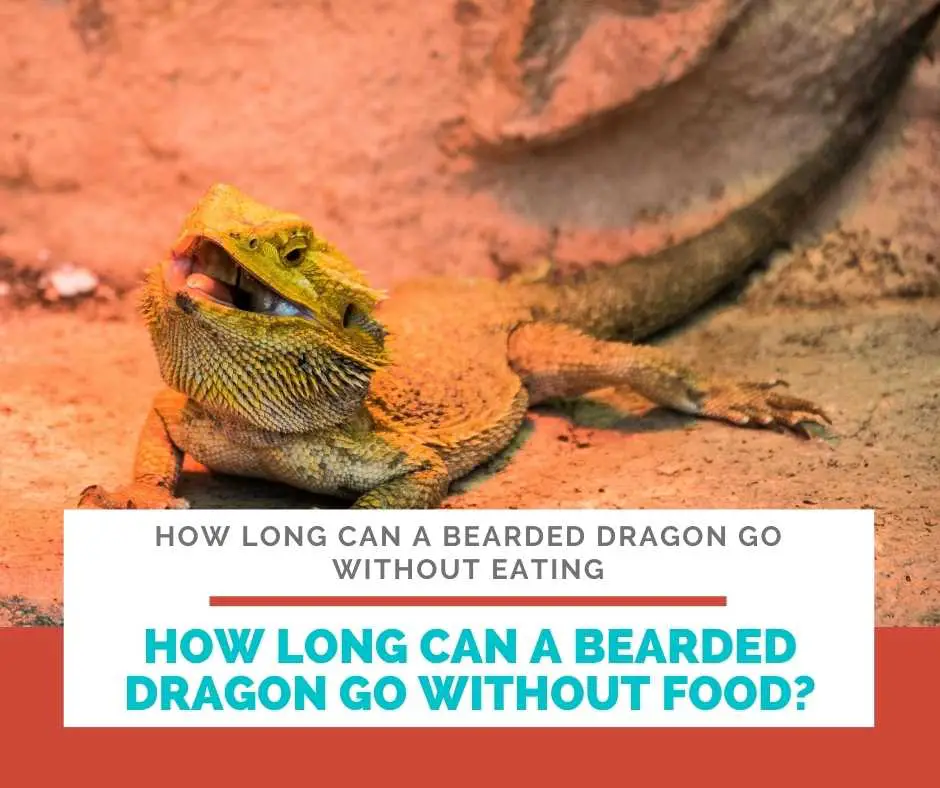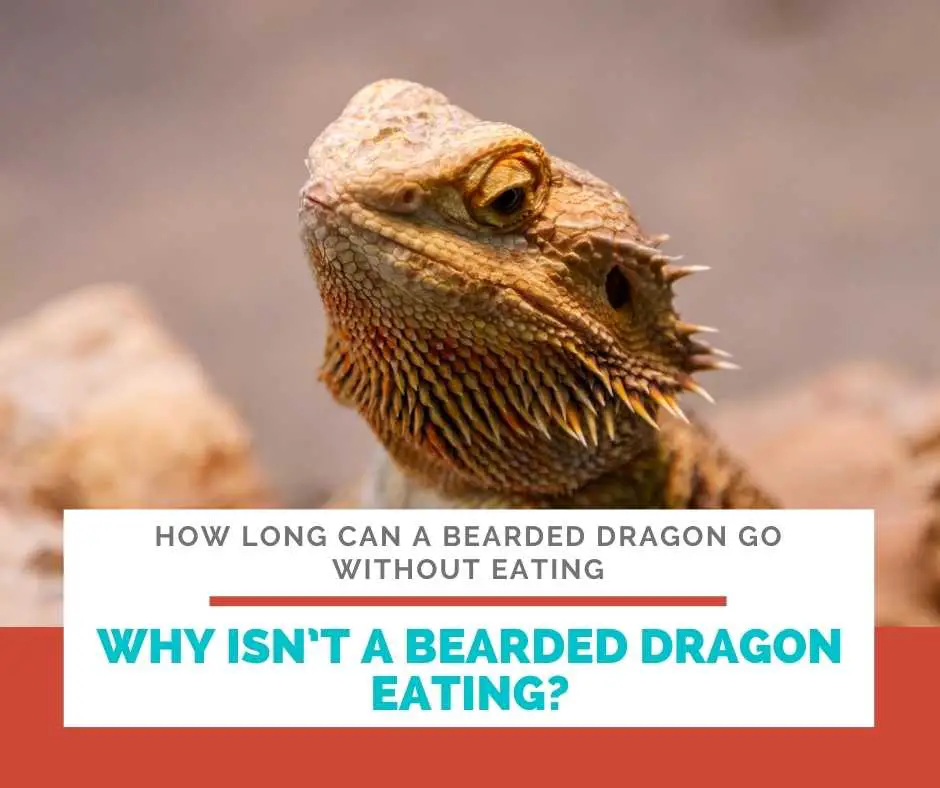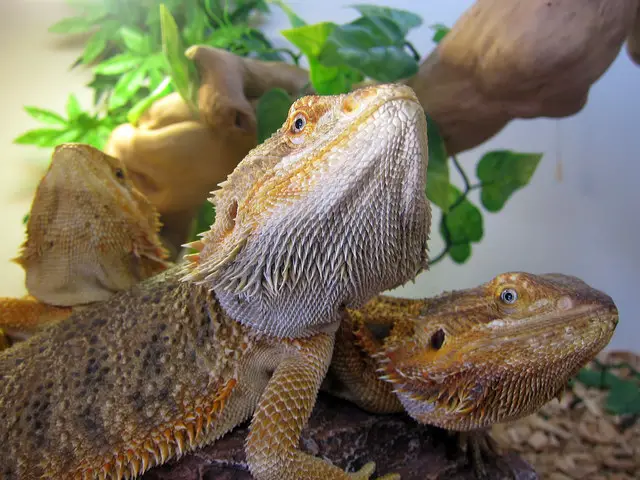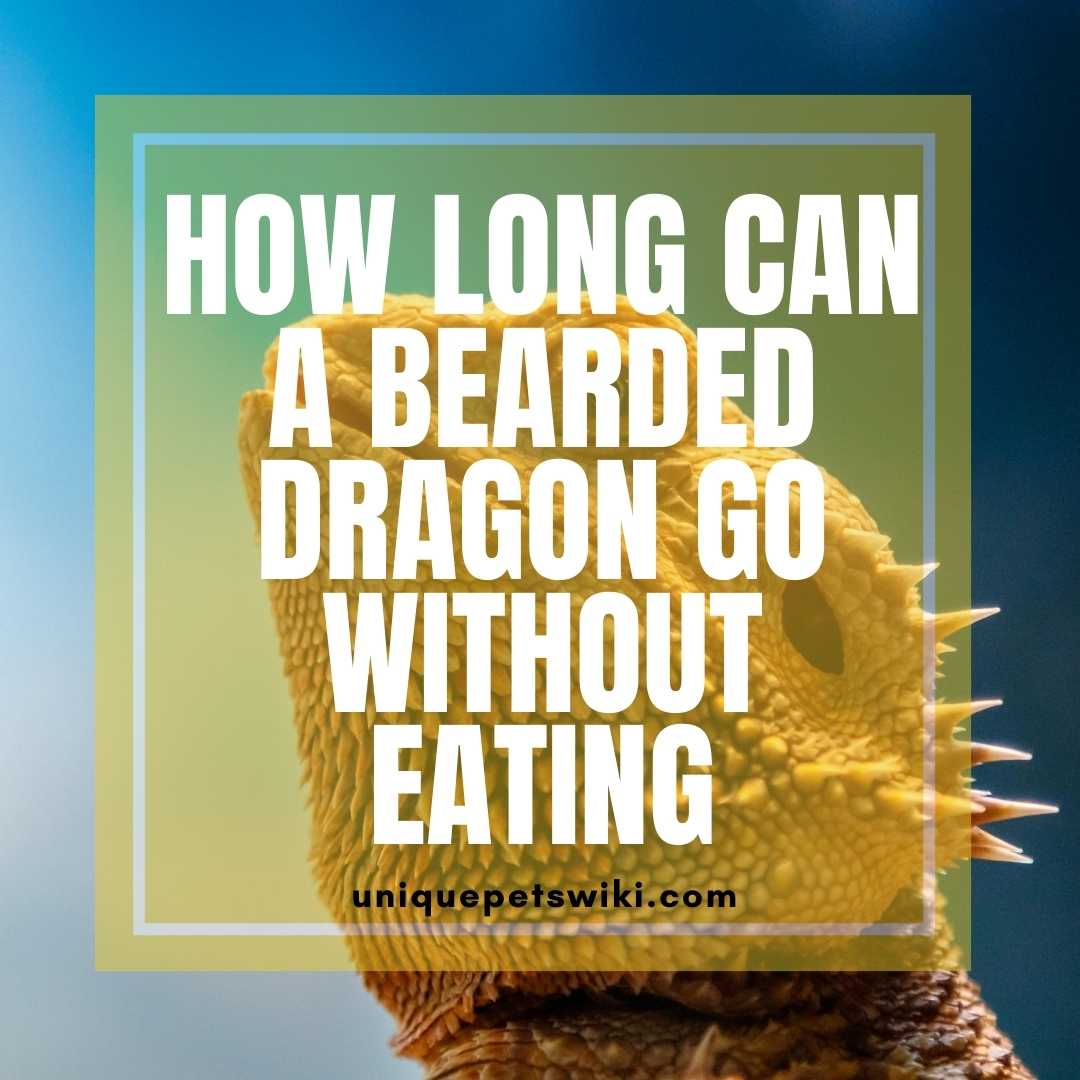Proper feeding is essential for all lizards as pets. If you are curious to know how long can a bearded dragon go without food, it is an appropriate concern. You will get the answer right here about the question: how long can a bearded dragon go without food.
As a good bearded dragon owner, you should know all behaviors that the beardies display to help you know when something goes unexpected.
For instance, when planning to go for a vacation, many people don’t know what to do about feeding their bearded dragons. This is a problem.
Also, when your pet is eating less or even stops eating, it will bother you, especially if you are not sure whether it is a must to feed the beardies every day. Read on to know how long a beardie can go without eating and more.
This article has been reviewed by Dr. Dilber. Read more about our knowledge control process here.
Contents
How Long Can a Bearded Dragon Go Without Food?

It is essential to feed your beardie pet daily, the truth is that bearded dragons can survive for different durations without food.
It all depends on a couple of factors including size, age, health, and the reason for your bearded dragon not eating.
Overall, an adult bearded dragon can go about 2-3 days without food. If you need a longer period for vacation it also can.
For baby and juvenile dragons, they need to be fed more frequently. Leaving them alone without food for a day is an OKAY option. But I would suggest that you should get closer to them.
I’m happy that you are now aware that bearded dragons can survive without food. But it should never be an excuse for you not to provide food to your pet daily. Of course, the way we need food every day to stay healthy and strong, so are the beardies.
However, the knowledge of how long the dragons can live without eating will be more helpful, especially the time you are away from home for a couple of days. It is not guaranteed that you will get someone caring enough to look after your beardie when you are away.
Therefore, having the right information on bearded dragons staying without food will help you to plan and leave what can sustain your pet without starving it. This is also an excellent idea to keep people away from your home when you aren’t around, especially when you don’t trust them.
When a bearded dragon refuses to eat food, and this behavior continues for several days, it will indeed trouble you. But the fact that beardies can go without food, will help you rest assured that your pet is safe unless you think it has a health problem.
Here is how long the bearded lizard can go without food depending on age.
Baby Bearded Dragons
With no guessing, I’m sure you are aware that baby bearded dragons will need to feed more frequently than the adults and juveniles. If you own a dragon pet, I’m sure you have observed that, and you totally agree with me.
Let me make it clear and more understandable to you right here and now. The babies are rapidly growing; if you check them, you will notice that they keep changing every day. Due to fast growth, babies need plenty of food to keep them growing.
The metabolism of baby beardies is too fast as compared to juvenile and adult beardies. So, they should not without food for more than a day.
They need foods that consist of more proteins to help them grow strong and remain healthy. Therefore, this means that baby dragons cannot go for quite a long time without food for sustenance. They are at their delicate stage where they require daily care and a lot of your attention.
You have to be closer to them daily and make sure they don’t miss a single meal. They need everyday nourishment because they are growing at an alarming rate.
Juvenile Bearded Dragons
If your lizard pet is a juvenile, you may have some peace leaving it for a day. But remember, all young bearded dragons, including the juveniles, are in their growing stage. They are also growing so quickly and need you to feed them more often.
Compared to babies, the juvenile lizard’s growth rate slows down a little bit. Half of their diet should consist of proteins to make them grow strong and healthy. They can survive upto three days without any severe health effects.
However, skipping food even for one day will not be the right choice because it has some effects on growth. Juveniles will need daily nourishment since they are also growing fast.
Adult Bearded Dragons
Having an adult bearded dragon means you have more freedom. First, adults don’t need to eat more frequently, like babies and juveniles. They only need to feed once or twice a day. Whichever the case, it is okay with them.
Secondly, adult dragons can go for a couple of days without having anything to eat, and there will be no issues. This is possible because the adults have a low metabolism, and they can break down the body fats, which is converted to energy for sustenance.
So once a beardie is an adult, it can go for a couple of days without food. This is more evident, especially in wild beardies that can survive for several weeks without eating. They mostly depend on the reserve body fat to survive during that period.
Leaving an adult beardie for 2-3 days or even a week at most will not be a bad idea. They can survive for all that time without food.
Adult beardies can survive upto several months without food. If your bearded dragon has gained too much weight, you can stop feeding it for several weeks or a month. As a result, it will utilize body fat reserves as energy source.
Why Isn’t a Bearded Dragon Eating?

It is common for the bearded dragons to refuse to eat, and if you don’t know what is happening, it can worry you. Besides from age that we have discussed above, there are many situations where bearded dragons stay without eating.
Let’s explore various reasons that can make the beardies not to eat and how it can affect their health.
Brumation
Brumation is the period when the majority of the reptiles spend a pretty long time sleeping to avoid extreme colds during winter. It is by far the primary cause of bearded lizards to stop eating.
In the desert, the beardies tend to bury themselves in the soil; they don’t move, eat, nor pass a bowel movement. On the other hand, not all bearded dragons in captivity will go into brumation.
So, if your pet does not brumate, it is healthy, and there is nothing to worry you. Typically, a hibernating dragon can go for two months with no food, but be sure to provide water.
Change in Diet
Bearded dragons are fussy eaters, and sometimes handling them is difficult, especially when they are introduced to new foods. If your pet is used to eating live insect feeders, they may not want to take dried insects or anything else.
It can take one week or perhaps more before the beardie can accept the new food; that’s how stubborn they can be, but it is normal. The truth is that during this duration, when the dragon is not eating, it can detrimentally affect their health.
But don’t give up yet, keep offering the new food to your pet, and it will eventually cave in and understand you are the boss. It will then accept the food. However, when you notice that the lizard is losing weight tremendously, you can give the food it will gladly eat.
Illness
You may assume that your beardie is not eating because it is brumating when it is actually suffering due to an illness. Sickness can make the dragon reduce appetite. But diseases are rare in beardies, and this means that in most cases they are refusing to eat due to other reasons.
A bearded dragon may suffer from health issues such as digestive problems, and stress.
Though, if you feel that your lizard is having a problem, make sure to inform your reptile vet. The vet will be in an excellent position to tell if the dragon is sick after diagnosis.
Incorrect Temperatures
The principal thing you should look for when your pet is refusing to eat its food is the temperatures in the habitat. Typically, bearded dragons are cold-blooded lizards, and due to this, they need to live in hot places to keep their body warm.
If the temperatures in the enclosure are below average, the beardie can become lethargic, and it will definitely refuse food. Maintaining optimum temperatures in the habitat is necessary to help the beardies in digesting the food effectively.
Improper digestion due to low temperatures means that the beardie will be unable to take the next meal.
To prevent bearded dragons from getting cold, you should keep the tank’s temperature at the ideal level. The basking spot should be between 95-110℉ depending on the age and the cool area at around 80-90℉.
Stress and Bearded Dragons
Stress is a significant threat to bearded lizards because it makes them use plenty of energy instantly. Beardies can refuse to eat food due to stress.
Many things can cause stress in bearded dragons, including other dragons, household pets, items of clothing, toys, inappropriate tank conditions, among others.
A stressed dragon will express other signs like a black beard, and it will behave unusually. Make sure to check anything around that might be stressing your pet and remove it.
Remember, what may seem an everyday thing to you might be the reason why the beardie is getting stressed. Stress should end after a few hours when you discover and remove whatever is causing it. Sometimes the beardie can take even a week depending on the severity of the stress.
Change in Environment

If you have recently brought a new beardie at home or you changed its enclosure, or you introduced new accessories in the cage, the dragon will indeed be disturbed. Bearded dragons are territorial animals and are pretty sensitive should anything change in their habitat.
A change in the cage or environment could be the reason why your pet is refusing to eat. The worrying thing is that you may be unable to resolve anything if the beardie is new to your home. You only need to give it time, and the problem will be solved once the dragon adapts.
But if there is stress because of the changes you made in the enclosure, try removing the new materials and observe how the beardie behaves. If the lizard regains its appetite, then be sure to toss any item you removed.
Can I Force Feed My Bearded Dragon?
Force-feeding a bearded dragon is not something new, and a good number of people have experienced it.
However, you should not wake up one day and decide that because your beardie is not eating, you are going to force-feed it. It will not be the right decision because, in the process, your friend might get hurt.
Typically, bearded dragons will eat what they need, and if you are forcing them to take what they have rejected, it might result in health issues.
The only time a beardie should be force-fed is when it becomes clearly weak, and it is getting more and more thinner. But like I said, never attempt to force-feed a beardie on your own.
Vet comment: Do not feed too much by force-feeding. Because due to hormonal imbalance, it is not in a position to digest in bulk
You must first take the beardie to your reptile vet to get the go-ahead on force-feeding. You should only force-feed your dragon when the vet recommends it. Besides that, the vet will also show you the best way to force-feed a bearded dragon properly.
So, after receiving permission from your reptile vet, here are the steps you will follow in force-feeding a dragon. It is a straightforward process.
- Slowly pick the bearded dragon and hold it gently and carefully.
- Make sure it is comfortable with the holding.
- Open the beardie’s mouth by pulling down the lower jaw and do it gently.
- Introduce some food into the mouth.
- Sometimes, you may need to use a syringe when you are feeding the baby bearded dragon foods.
Wrapping Up
I hope you found this article essential and you enjoyed learning about how long a bearded dragon can go without food.
When a bearded lizard stops eating, it is essential to know that most of the time, it is something you can quickly address. So, if the beardie is refusing to eat and it is not brumating, it requires you to check the reason for that and act accordingly.
I’m hoping that you now understand how long a beardie can live without eating. It is a good thing if you know everything about your pet. It will help you to respond in the appropriate way when the beardie needs your help.

1 thought on “How Long Can a Bearded Dragon Go Without Food?”
Comments are closed.